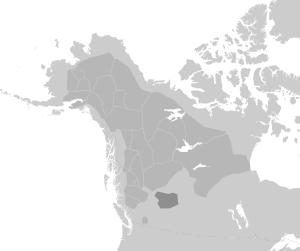Tsuutʼina language facts for kids
Quick facts for kids Tsuutʼina |
||||
|---|---|---|---|---|
| Sarcee Tsúùtʼínà |
||||
| Native to | Canada | |||
| Region | Alberta | |||
| Ethnicity | Tsuutʼina | |||
| Native speakers | 80 (2016 census) | |||
| Language family |
Dené–Yeniseian ?
|
|||
 |
||||

|
||||
|
||||
The Tsuutʼina language is spoken by the Tsuutʼina Nation people. Their community and land are located near Calgary, Alberta in Canada. This language belongs to the Athabaskan language family. Other languages in this family include Navajo and Dene Suline.
Contents
Understanding the Name Tsuutʼina
The name Tsuutʼina comes from the people's own word, Tsúùtʼínà. This word means "many people," "nation tribe," or "people among the beavers." You might have heard the language called Sarcee before. This was an older name given by others, not by the Tsuutʼina people themselves.
How Tsuutʼina Sounds: Vowels and Tones
The Tsuutʼina language has four main vowel sounds: i, a, o, and u. While the 'a' and 'o' sounds usually stay the same, the 'i' and 'u' sounds can change a bit.
Just like in music, Tsuutʼina also uses different tones (the pitch of your voice) to change the meaning of words. It also uses vowel length, meaning how long you hold a vowel sound.
- A long vowel is shown with an asterisk, like a*.
- A high tone is marked with an accent, like á.
- A low tone is marked with a different accent, like à.
- A middle tone is marked with a line above it, like ā.
Words in Tsuutʼina: Nouns and Possession
In Tsuutʼina, nouns (words for people, places, or things) do not change their form much. For example, the word for one dog is often the same as the word for many dogs. However, words for family members, like "mother" or "father," do change to show if they are singular or plural.
Common Tsuutʼina Nouns
People and Family Words
- Husband - kòlà
- Man, human - dìná
- Wife - tsʼòyá
- Woman - tsʼìkā
- Grandmother - is'su
- Grandfather - is'sa
- Mother - in'na
- Father - it'ta
Nature Words
- Buffalo, cow - xāní
- Cloud - nàkʼús
- Dog - tłí(chʼà)
- Fire - kù
- Mud, dirt - gútłʼìs
- Snow - zòs
- Water - tú
Useful Phrases
- My name is (..) - sizi
Showing Possession with Nouns
You can show that something belongs to someone by adding a small part to the beginning of a noun. This is called a prefix. For example, the word for "knife" is más. If you want to say "my knife," you add si- to get sìmázàʼ.
Some nouns can be used alone or with a possession prefix. Other nouns, like the word for "snow" (zòs), are always used alone. And some nouns, like the word for "head" (-tsìʼ), must always have a possession prefix.
Common Possession Prefixes
- si- (for "my" or "mine")
- ni- (for "your" or "yours")
- mi- (for "his," "her," or "its")
- ɣi- (another way to show possession, used in Athabaskan languages)
Saving the Tsuutʼina Language
The Tsuutʼina language is currently in danger of disappearing. In 2016, only about 150 people spoke it, and only 80 of them learned it as their first language.
To help keep the language alive, the Tsuutʼina Nation has created the Tsuutʼina Gunaha Institute. This group works to teach more people to speak Tsuutʼina fluently. They have special schools on the Nation's land where kids from kindergarten to fourth grade learn everything in Tsuutʼina. They even put up stop signs in the Tsuutʼina language to help people see and use the language every day!
See also

